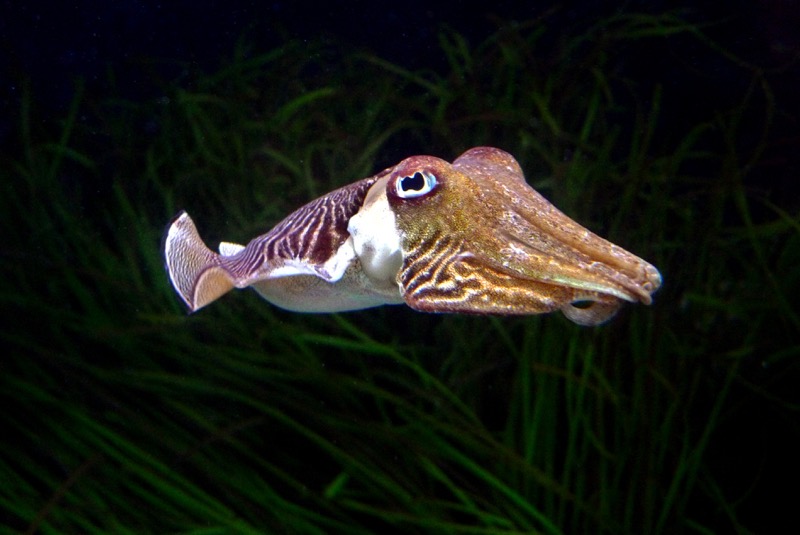‘They really go out with a bang,’ says Alex Schnell, a cuttlefish scientist at the University of Cambridge and Marine Biological Laboratory in Massachusetts.
Sexual maturity usually occurs late in a Cuttlefish’s lifetime—around three-quarters of their two-year life cycle. It is a bit like humans reaching puberty in their 60s. But then the elderly cephalopods will go on binge sex for several weeks, mating with as many partners as they can.
When the frantic sex is over, they succumb to genuine decrepitude: their feeding tentacles go limp; they don’t feel hunger; their colour-changing skin flickers. They transition very quickly from their sexual peak to the pangs of infirmity, and they die within days.
However, this late sexual maturity may be related to why Cuttlefish—cousins of octopuses and squid—can retain memories of personal experiences until very late.
According to a recent study, squids can remember the experience of their favourite meal, and, unlike humans, that capacity improves with age.
The human brain can retain some memories longer than others. Facts such as the location of the closest grocery store, known as semantic memory, don’t diminish with time.
However, humans can recall particular experiences that involve not just where and when something occurred, but also the exact feelings while it occurred. This ‘episodic memory’ typically fades with time.
‘Episodic memories’ are a source of subjective knowledge. They exist in the realm of personal narrative; each one unique to the person who creates it. Until the late 1990s, there was little evidence that animals could handle even the most fundamental aspects of this type of recall.
Studies on jays, rats, and monkeys show that they, too, have both types of memory. Another species, the Cuttlefish, with their big and complex brains, joined the group few years ago.
To first test their ‘semantic memory,’ researchers taught 12 and 24-month-old Cuttlefish (Sepia Officinalis) to eat each meal in a different place in their aquariums. Three weeks later, even when scientists did not provide food, the animals, young and old both, came up on time for their meals. This indicated that they acquired important information and that their semantic memory was robust.
Then, a new variable was added to the experiment. The researchers fed the Cuttlefish two meals at the same time, some prawn flesh and their preferred live grass shrimp, at two different locations in their aquariums.
The Cuttlefish were then given two further meals in the specified tank locations, but at different times: one hour after the first meal, they were fed boring prawn, and three hours later, they were given both prawn and shrimp.
After four weeks, the researchers let the creatures ‘select’ their food by swimming to the appropriate area of the tank at the appropriate time. If they swam to the prawn region one hour after their initial meal, they would obtain prawn but not shrimp. They could get both shrimp and prawns if they waited 3 hours and went to the shrimp section.
According to the study published in the Proceedings of the Royal Society B, both young and elderly animals learned to wait longer for the shrimp. Scientists concluded that they had developed sophisticated, episodic memories that included not just where and when they ate, but also which meal they liked better.
‘I’m not familiar with any other animal model that has shown episodic-like memory still intact’ this late in life, says Gabriel Nah, a neurobiologist at Indiana University who studies rat memory. While she was not involved in the research, she was amused by these characteristics discovered by Schnell’s research.
Schnell explains that most old individuals would have failed a human version of the team’s tests. However, all of the Cuttlefish survived regardless of their age. Robyn Crook, a neurobiologist and cephalopod specialist at San Francisco State University was not involved in the research. However, she exclaimed that the experiment was an extraordinarily complicated thing for an animal to pass.
‘I thought the older cuttlefish … just wouldn’t perform as well as the younger cuttlefish,’ says Schnell, who was surprised to find that the memories of Cuttlefish did not decline with age.
Schnell said that the older cuttlefish were quicker at learning the principles and applying them in new situations, which she described as ‘pretty mind-blowing.’
Although Cuttlefish, like humans, exhibit brain degeneration as they age, their vertical lobe, a region linked to learning and memory, appears to remain intact. Schnell believes that the abilities shown by the cephalopods in these tests might be transferred to hunting or even their ‘over-the-hill orgies.’
Replaying personal experiences in their heads could help them remember which males or females they mated with. Since the Cuttlefish’s primary objective throughout the breeding season is to mate with as many partners as possible, episodic memory helps them remember who they mated with, where, and when. This way, they don’t keep mating with the same partner.
Cuttlefish may be one of the few creatures with enough cognitive power to use their memories to plan ahead of time. Schnell and others’ previous study has revealed that cephalopods have self-control that takes human youngsters years to fully mature.
Some researchers are doubtful that what-when-where memory, however remarkable, may not qualify as episodic-like memory. Jennifer Vonkan–––animal cognition specialist at Oakland University in Michigan who was not involved with the study–––thinks that it’s conceivable that the cuttlefish exercise wasn’t challenging enough to truly test the boundaries of their memory.
The cephalopods’ weak points may have been more visible in more natural conditions, with more distractions. Adapting human ideas and experiments to other creatures is always a difficult task because other species’ desires and requirements, as well as the intelligence required to navigate them, are very different.
-30-
Copyright©Madras Courier, All Rights Reserved. You may share using our article tools. Please don't cut articles from madrascourier.com and redistribute by email, post to the web, mobile phone or social media.Please send in your feed back and comments to [email protected]











